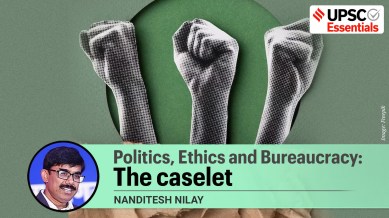UPSC Ethics Simplified | Politics, ethics and bureaucracy: The caselet
Dive deep with Nanditesh Nilay into an essential case study questioning the role of a bureaucrat on the issue of politics and ethics. Don't miss the Post Read Questions and consolidate your preparation for UPSC CSE.

UPSC Ethics Simplified draws your attention to a topic of greed and desire in the form of a caselet. This caselet is an extension of the concept discussed on November 19 (Politics and Ethics: The concept). It is advised to revisit the concept article before reading the caselet below.
Relevance: The topic is a part of UPSC CSE General Studies Paper-IV Ethics syllabus. Concepts are particularly relevant in the theory section. Aspirants will also find the article useful for their Essay paper and situation-based questions in personality tests. Moreover, the essence of the article will help aspirants in their professional lives or in life in general. Nanditesh Nilay writes for UPSC Ethics Simplified fortnightly on Sundays. The first article will be a concept while the second article will be a caselet based on the concept.
monthly limit of free stories.
with an Express account.
THE CASELET
You are working in the ministry and you have a wonderful rapport with your department senior. He used to help you a lot of times at the beginning of your career and you feel grateful to him. However, you got to know that from time to time some funds are being diverted from one head to the other without permission of the legislature. Interestingly, you learned from some sources that such diversions are normal and everything is done as per the rule book. All of a sudden, you decided to bring this matter to your senior. Your senior received your concern sincerely and assured you of taking this grave issue further. He even said, “Thanks for sharing but leave this matter now. It is beyond my jurisdiction.” You felt discouraged.
One day you decided to update the minister about all these diversion of funds as the minister was new to the ministry. However, your intention was not received well by your immediate boss. He advised you to focus on your responsibilities. But there was an urgent requirement of funds in your department, so you decided to apprise the minister in person. As soon as you shared your intention with your senior, he firmly advised you, “Don’t try to play with fire. You are a bureaucrat and behave like a bureaucrat.”
Post Read Questions:
Question 1: In your opinion if an ethical issue is beyond your jurisdiction, what should you do? Explain with reference to the caselet.
Question 2: “You are a bureaucrat and behave like a bureaucrat.” What did the senior mean by this line? How should a bureaucrat ideally ‘behave’?
Question 3: With reference to the caselet explain how politicians and bureaucrats work hand in hand.
Ethicist view:
In my view without any fuss, one can let the diversion of funds take place and that is because ultimately the funds are used for the public purpose. Moreover, it is only a reallocation of funds and the case doesn’t indicate that the funds are being used for personal gains. However, it is wise to report the matter as even the diversion of funds needs proper approval. But report to whom? Directly to the minister? I don’t think so. Any minister is quite capable of knowing the happenings around them. And it is not a pragmatic decision from a bureaucrat’s side to jump the chain and act like a whistleblower. In the end, it may be possible that such diversion may have some ulterior motive apart from public purpose. Therefore the officer must apprise the matter to his immediate superior.
Edited by Manas Srivastava
(The writer is the author of ‘Being Good and Aaiye, Insaan Banaen’. He teaches courses on and offers training in ethics, values and behaviour. He has been the expert/consultant to UPSC, SAARC countries, Civil services Academy, National Centre for Good Governance, Central Bureau of Investigation (CBI), Competition Commission of India (CCI), etc. He has PhD in two disciplines and has been a Doctoral Fellow in Gandhian Studies from ICSSR. His second PhD is from IIT Delhi on Ethical Decision Making among Indian Bureaucrats. He writes for the UPSC Ethics Simplified (Concepts and Caselets) fortnightly.)
Share your views, answers and suggestions in the comment box or at manas.srivastava@indianexpress.com